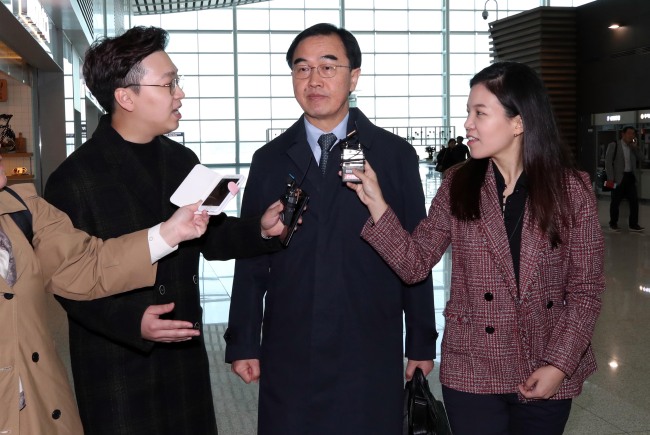With what seems like stalled nuclear negotiations between Washington and Pyongyang and signs of possible discord between Seoul and Washington on North Korea issues, experts forecast a cloudy outlook for inter-Korean cooperation projects.
On Monday, the two Koreas held a second meeting of their joint roads research group for the modernization of cross-border roads, but failed to produce noteworthy results, such as dates for joint surveys of their roads.
 |
Unification Minister Cho Myoung-gyon (Yonhap) |
A project to modernize and reconnect cross-border railways has also been struggling to make dramatic progress. The process has been halted since August, after the US-led United Nations Command declined the Seoul government’s proposal to test-run a train across the border.
Last month, the South and North agreed to carry out a joint survey of the railway that runs along the west coast of the Korean Peninsula, known as Gyeongui Line, by late October that has yet to materialize.
A planned performance by a North Korean art troupe also did not take place in October, with the Ministry of Unification recently admitting the North has been mum on the matter.
With international sanctions continuing to stand in the way of inter-Korean cooperation, coupled with growing skepticism among US lawmakers and the public of North Korea’s willingness to denuclearize, experts said it the stall in nuclear talks are likely to create further stumbling blocks.
“The Center for Strategic and International Studies report identifying at least 13 out of an estimated 20 undeclared missile operating bases inside North Korea, is prompting doubts within the US about North Korea’s willingness to denuclearize, and with the Democrats seizing control of the lower of the US Congress in midterm elections there is expected to be a stall in nuclear talks,” Cho Han-bum at the Korea Institute for National Unification said. Cho explained that the Democrats would want to expand Washington’s North Korea agenda, including human rights issues, thus prompting a further delay in the denuclearization timeline.
“The recent launch of the joint working group between Seoul and Washington is part of the US’ intentions to keep a close eye on progress in inter-Korean ties, which means it won’t speed up the timeline of implementation of inter-Korean projects,” he added.
Seoul and Washington have recently had a flurry of diplomatic coordination talks amid reports they may remain at odds over the fast pace of inter-Korean engagement at a time when the communist state has yet to take tangible denuclearization steps, such as a full declaration of its nuclear inventory.
The growing skepticism in the US is expected to create obstacles for Unification Minister Cho Myoung-gyon, who embarked on a trip to the US on Tuesday to meet with US officials and lawmakers to discuss issues surrounding the North’s denuclearization and inter-Korean relations. He is expected to meet US Secretary of State Mike Pompeo and Rep. Ed Royce (R-California), chairman of the House Foreign Affairs Committee, during his visit.
“This is a meaningful trip that comes at a very important time,” Cho told reporters before boarding a plane bound for the US at Incheon Airport.
“In Washington and New York, I will meet government and parliamentary officials, and many other experts to discuss the denuclearization of the Korean Peninsula and the establishment of peace,” he added.
By Jung Min-kyung (
mkjung@heraldcorp.com)








